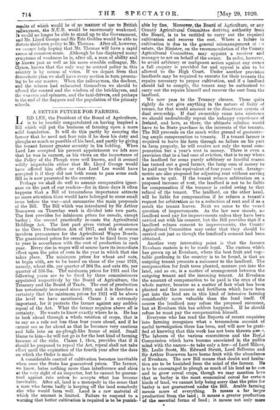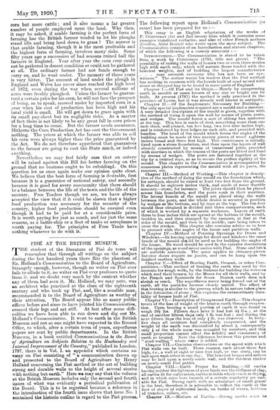A BETTER FUTURE FOR FARMING.
TRD LEE, the President of the Board of Agriculture, 4 is to be heartily congratulated on having inspired a Bill which will put the business of farming upon a more solid foundation. It will do this partly by assuring the farmer that he need not fear rain if he does his duty and ploughs as much as possible of his land, and partly by giving the tenant farmer greater security in 'his holding. When Lord Lee accepted his present appointment we felt sure that he was in earnest, as his views on the importance of the Policy of the Plough were well known, and it seemed wildly improbable either that Mr. Lloyd George would have offered him office or that Lord Lee would have accepted it if they did not both mean to pass some such Bill as is now presented to the country. Perhaps we shall do well to assume comparative ignor- ance on the part of our readers—for in these days it often happens that a Bill of tremendous importance attracts no more attention than would have belonged to some small issue before the war—and summarise the main proposals of the Bill. The Bill which was introduced by Sir Arthur Boscawen on Thursday week is divided into two parts. The first provides for minimum prices for cereals, except barley ; the second practically re-casts the Agricultural Holdings Act. The first part gives virtual permanence to the Corn Production Act of 1917, and this of course involves permanence for the Agricultural Wages Boards. The guaranteed prices for cereals are to be fixed from year to year in accordance with the cost of production in each year. Every rise in wages will of course have its immediate effect upon the price of corn in the year in which that rise takes place. The minimum prices for wheat and oats, to begin with, are to be based on those of the year 1919, namely, wheat 68s. per quarter of 6041bs. and oats 46s. per quarter of 336 lbs. pm minimum prices for 1921 and the following years are to be fixed by three commissioners appointed respectively by 'the Board of Agriculture, the Treasury and the Board of Trade. The cost of production has notoriously increased since 1919, and it is therefore a certainty that the minimum prices for 1921 will be above the level we have mentioned. Clause 1 is extremely Important, for it protects the farmer against any sudden repeal of the Act. What the farmer requires above all is certainty. He wants to know exactly where he is. He has to look ahead through a whole rotation of crops, that is to say as a rule not less than four years ahead, and if he cannot see so far ahead as that he 'becomes very cautious and falls into an un-plough-like frame of mind. Small blame to him—he will not go in for the best kind of farming because of the risks. Clause 1, then, provides that if it should be proposed to repeal the Act, repeal shall not take effect until the expiration of the fourth year after the date on which the Order is made.
A considerable control of cultivation becomes inevitable when once the State has guaranteed prices. The farmer, we know, hates nothing more than interference and shies at the very sight of an inspector, but he cannot be guaran- teed against ruin unless he accepts what has become inevitable. After all, land is a monopoly in the sense that a man who farms badly is keeping off the land somebody else who would farm well. Land is a raw material of which the amount is limited. Failure to respond to a warning that better cultivation is required is to be punish- able by fine. Moreover, the Board of Agriculture, or any County Agricultural Committee deriving authority from the Board, is to be entitled to carry out the required cultivation and recover the cost. Where a failure in cultivation is 'due to the general mismanagement of .rn estate, the Minister, on the recommendation of the County Agricultural Committee, may appoint a receiver and manager to act on behalf of the owner. In order, however, to avoid arbitrary or malignant action against any owner a full enquiry is provided for and appeal is also to be allowed to the High Court. Under another provision landlords may be required to execute for their tenants the repairs necessary to proper cultivation, and if a landlord should fail to comply, the tenant may be authorised to carry out the repairs himself and recover the cost from the landlord.
We now pass to the Tenancy clauses. These quite rightly do not give anything in the nature of fixity of tenure, for that would amount to the disastrous system of dual ownership. If dual ownership came into existence we should undoubtedly repeat the unhappy ,experience of Ireland, and here, as there, the ultimate solution would have to be State purchase in the interests of the tenants. The Bill proceeds on the much wider ground of guarantee- ing ample compensation to tenants. If a tenant farmer is required to leave his farm through no failure on his part to farm properly, he will receive not only the usual com- pensation but a year's rent in money. There is even a provision that in a bad case of eviction, thatis to say where the landlord for some purely arbitrary or fanciful reason has turned out a good farmer, the lump sum of money to be paid may be the equivalent of four years' rent. Arrange- ments are also proposed for adjusting rent without serving a notice to quit. If the tenant refuses arbitration on a proposed increase of rent, the landlord is not to be liable for compensation if the tenancy is ended owing to that refusal of the tenant. The landlord, on the other hand, will be liable for compensation if he refuses a tenant's request for arbitration as to a reduction of rent and if as a result the tenant leaves. Next we come to the vexed question of improvements. As the law now stands, no landlord need pay for improvements unless they have been carried out with his consent, but the Bill provides that if a landlord refuses consent to improvements, the County Agricultural Committee may order that they should be carried out just as though the landlord's consent had been obtained.
Another very interesting point is that the famous Evesham custom is to be made legal. The custom which has grown up at Evesham, where the best fruit and vege- table gardening in the country is to be found, is that an outgoing tenant presents a successor to the landlord. The compensation for fruit trees planted, manure put into the land, and so on, is a matter of arrangement between the outgoing tenant and the incoming tenant. At Evesham the amount of compensation to be paid is the crux of the whole matter, because as a matter of fact what has been planted and the manure and fertilisers which have been put into the land are in this kind of intensive farming considerably more valuable than the land itself. Of course the landlord may refuse the proposed successor, but at Evesham this has seldom happened. If he should refuse he must pay the compensation himself. Everyone who has read the Reports of recent enquiries into farming recognises what a tremendous amount of useful investigation there has been, and will now 'be grati- fied at knowing that this work has not been thrown awe.!.. The labours of the various committees and the Roy.al Commission which have become associated in the public mind with the names—to take only a few—of Lord Milner, Mr. Leslie Scott, Mr. Edward Strutt, Lord Selborne and Sir Arthur Boscawen have borne fruit with the abundance of Evesham. The new Bill means that doubt and hesita- tion are to be banished from the mind of the farmer. He is to be encouraged to plough as much of his land as he can and to grow cereal crops, though we may mention here that as barley is the most economical cereal for certain kinds of land, we cannot help being sorry that the price for barley is not guaranteed under the Bill. Arable farming means more of everything. It means a far larger production from the land ; it means a greater production of the essential forms of food ; it means not only more •
corn but more cattle ; and it also means a far greater number of people employed upon the land. Why then, it may be asked, if arable farming is the perfect form of farming has the British farmer tended to let his ploughs stand idle and bring land down to grass ? The answer is that amble farming, though it is the most profitable and the highest form of farming, involves many risks. Some fifty years ago a succession of bad seasons ruined half the farmers in England. Year after year the corn crop could not be gathered in decent condition or could not be gathered at all. The ordinary farmer had nob funds enough to carry on, and he went under. The memory of those years is very bitter. The amount of land under the plough in England and Wales has never since reached the high level of 1872, even during the war when several millions of acres were freshly ploughed. Unless the farmer be guaran- teed a certain price for his corn, he will not face the prospect of being, so to speak, snowed under by imported corn in a year when his cost of production has been high and his total yield is small. He, will get down to grass again with its small pay-sheet but its negligible risks. As a matter of fact there is not likely to be any great fall in corn prices for a long time to come. But the farmer needs assurance. Hitherto the Corn Production Act has cost the Government nothing. The prices at which the farmer was able to sell his corn were always higher than the price guaranteed by the Act. We do not therefore apprehend that guarantees to the farmer are going to cost the. State much, or indeed anything.
Nevertheless we may feel fairly sure that an outcry will be raised against this Bill for better farming on the ground that no business ought to be. subsidized. On this question let us once again make our opinion quite clear. We believe that the best form of farming is desirable, first because it is a guarantee of national safety, and secondly because it is good for every community that there should be a balance between the life of the town and the life of the country. Free Traders though we are, we- have always accepted the view that if it could be shown that a higher food production was necessary for the security of the country, higher food production should be ensured even though it had to be paid for at a considerable price. It is worth paying for just as much, and for just the same reasons, as a battle-ship or a fleet of tanks or aeroplanes is worth paying for. The principles of Free Trade have nothing whatever to do with it.







































 Previous page
Previous page